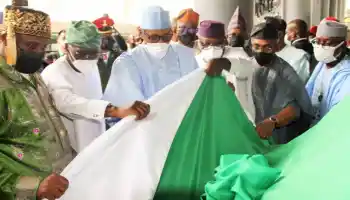Buhari commissions $1.5bn Lekki Deep Seaport, rice mill, blue rail, others today
President Muhammadu Buhari is expected to officially commission the $1.5 billion Lekki Deep Seaport, the 32-metric tons per hour Lagos Rice Mill and the Blue Rail Project, among others, today (Monday) in Lagos. By its size and depth, the Lekki Deep Seaport is expected to be the game changer in West and Central Africa. Other […]

President Muhammadu Buhari is expected to officially commission the $1.5 billion Lekki Deep Seaport, the 32-metric tons per hour Lagos Rice Mill and the Blue Rail Project, among others, today (Monday) in Lagos.
By its size and depth, the Lekki Deep Seaport is expected to be the game changer in West and Central Africa.
Other projects slated for commissioning are the 18.75km six-lane rigid-pavement Eleko Junction to Epe Expressway; the John Randle Centre for Yoruba Culture and History; and the MRS Lubricant Factory in Apapa
Buhari, during his two-day working visit, will be conducted round the port’s 1.5km long main.
- Kidnapping: DSS testifies against Sarkin Fulani of Kwara
- Northern Borno: A deprived region of Nigeria?
The seaport’s turning circle is 600 meters, which is enough for a vessel of up to 16,000 standard containers (TEU). The approach channel is 11 km long.
The chairman of Lekki Port, Mr Biodun Dabiri, had earlier said: “From what I can see, in the next four to five years, the economy of the Lekki environs would be worth $25 billion which translates to N10 trillion – an investment amount almost similar to the whole budget of Nigeria.
“I can tell you that if we focus on this axis alone, the ranking of Lagos as one of the largest economies in Africa would be better; we could move from the 4th to 3rd, 2nd and eventually Number 1.”
The Lekki Deep Seaport made history last year as it received the first-ever vessel (Zhen Hua 28) to berth at the port.
The port has three terminals: the container terminal, the liquid terminal, and the dry bulk terminal.
According to the promoters, the container terminal has an initial draft of 14 metres, with the potential for further dredging to 16.5 metres. The terminal is able to handle 2.5 million 20-foot standard containers per year.
The deep-sea port of Lekki is the first port in Nigeria with ship-to-shore cranes. It has three of these container gantry cranes; they belong to the “Super-post-Panamax” group – this means that they can reach and unload the rearmost row of containers even if the container ship is wider than the Panama Canal (49m or 160ft maximum boat beam).
The STS cranes have a fixed rail at the quayside. They can lift 65 tons in twin-lift mode, 50 tons in single-lift mode or 85 tons under a hook.
The port’s computerised system will allow container identification and clearance from the office, and human interaction will be minimal in the physical operations
When phase 2 is completed, the deep sea port will have three liquid berths. The liquid cargo terminal will handle vessels up to 45,000 DWT (dead weight tonnage) and can expand to reach a capacity of 160,000 DWT.
Liquids (like petrol or diesel) will be handled at a tank farm near the port. The docking area is equipped with loading arms. It is also connected by pipelines along the breakwater.
The bulk terminal with an available quay length of 300m can accommodate a Panamax class vessel (75,000 DWT).
